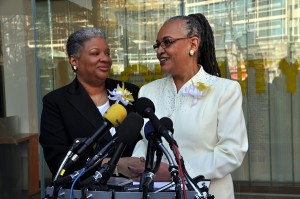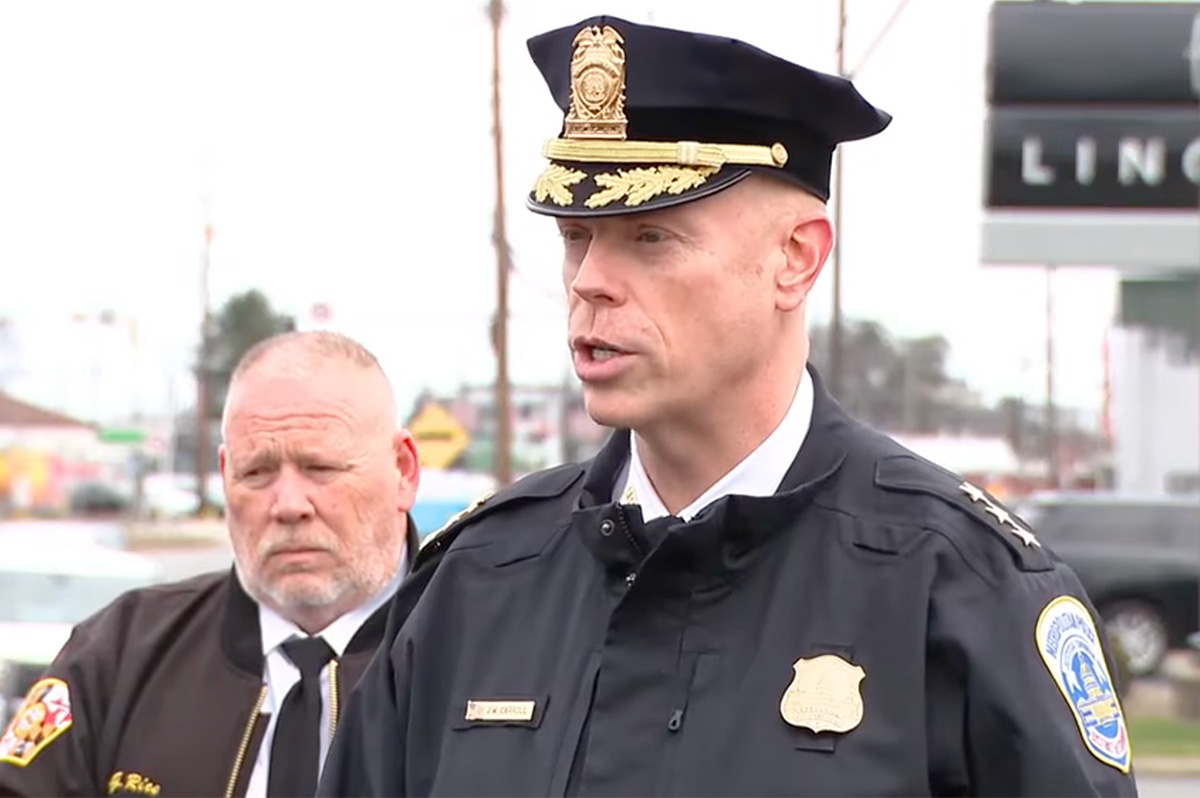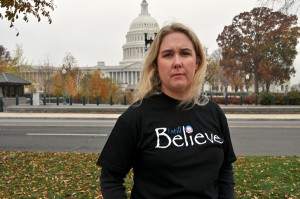Local
Anniversary for marriage
One year after the first same-sex couples wed in D.C., all eyes are on Maryland

Candy Holmes (left) and Darlene Garner on their wedding day last March. (Blade file photo by Michael Key)
As the battle over marriage equality in Maryland reaches its endgame, the sparks it throws are reflected in the lives of real people, including a married couple wed just next door in Washington on the first day the D.C. same-sex marriage law went into effect in March of 2010.
Residents of Bowie, Md., one of the three couples wed with fanfare at the Human Rights Campaign headquarters on March 9, 2010 — Candy Holmes and Darlene Garner — looked back this week at the struggles to win equality in D.C. and the continuing efforts in Maryland.
“In retrospect, it’s been a mixed year,” Holmes says. “Because it was a great year to be married in D.C. in my hometown and Darlene’s adopted city, really it was a year of a piece of heaven, once we got through the murky waters that it might be taken away by the courts. It was the realization of something long desired by us, to be married, and legally acknowledged so, to the love of my life.”
“But when we come back to where we live, in Maryland, where our marriage is not recognized, the struggle goes on because we were free to be married in D.C., but we are not free to be married in Maryland — yet.”
Holmes and Garner — who dated on and off for 14 years before getting married — are both ordained ministers in the Metropolitan Community Church (MCC), a liberal, mostly gay Christian denomination — and now they are determined to see the blessings afforded to them by marriage become theirs by right also where they live.
“We have so much enjoyed the last 12 months as a married couple,” Garner says. “We have been completely embraced by our extended and blended families — children, grandchildren, even great-grandchildren, cousins — and I will be eternally grateful to the D.C. government elected officials, and also remain hopeful that the elected officials in my home state will follow the example set in our national capital.”
When Garner and Holmes boast of their blended, extended family, they are not talking idly. Garner is the mother of four, grandmother of seven and great-grandmother of three, the eldest of whom is now 3 years old.
Holmes considers Garner’s offspring hers too.
The giddiness and hoopla from a year ago now long since subsided, how do they assess what marriage equality means to them today? Once they were married, “there’s been a big difference at work,” says Holmes, who has worked as a manager in the federal government’s GAO (now called the Government Accountability office) for 34 years. “It shows up in how people greet me and treat me, the respect and regard from others.”
Statistics from D.C. Superior Court’s Marriage Bureau show a surge of weddings in the District, more than double the number from the prior year, March 2009-March 2010.
Those numbers — 6,604 marriages in D.C. from March 3, 2010, when the same-gender right to marry, enacted in December 2009, went into effect, through March 2, 2011 — vaulted over the number from the prior year, when only 3,101 couples applied for marriage licenses in D.C.
The city doesn’t track how many straight couples there were versus same-sex couples, but the court attributes the spike to the change in the marriage law.
Speaking last week at an event held to celebrate enactment of the new law, Mayor Vincent Gray said he “was thrilled to hear this,” adding that the new law “has been so smoothly implemented,” even though he acknowledged that he has lost some friends due to his own outspoken support for the measure when he served on City Council until being elected mayor in November. But he said that was a price he willingly has paid for doing what he called “the right thing.”
As for the possibility that the new Republican majority in the U.S. House of Representatives might still seek to roll back the new law, the mayor said he was aware it could happen, but “I haven’t heard anything yet” about it.
And so the dust in D.C. has settled. And in the wake of the new law have come party planners and experts in wedding officiating like Deborah Cummings-Thomas and Sheila Alexander-Reid, both licensed and ordained to perform weddings, lesbians and partners since May of last year in Marry Me in D.C., which helps connect people wanting to marry in D.C. with what Cummings-Thomas calls “our network of gay and gay-friendly service providers who celebrate, not just tolerate them on their wedding day.”
On March 19, Marry Me in D.C. hosts a “Marriage Equality Wedding Expo,” from noon to 4 p.m. at the Washington Court Hotel, 525 New Jersey Avenue NW, on Capitol Hill. Tickets are $10 in advance or $15 at the door. Advance registration is encouraged at marrymeindc.com.
Marriage not a happy ending for all
With the legalization of same-sex marriage comes, inevitably, gay divorce.
Robin McGehee has felt its sting. The 37-year-old California resident and lesbian who decided to wed in June 2008, says she decided to un-wed a year and a month later, in July 2009. She and her partner took their vows under California’s same-sex marriage law prior to its being overturned by the state’s voters in November 2008 ballot when Proposition 8 passed. Their marriage remained valid however under a grandfather clause.
But it fell victim nevertheless, in an ironic way, says McGehee, since it was the fight against its passage that brought her into the fray to oppose Prop 8.
After getting iced out of volunteer work at her son’s Catholic school, she became a gay activist and helped organize the National Equality March, held in Washington in October 2009. As a newly mobilized activist, she says, she was “on the road almost every weekend for months at a time.”
And that activism led her away, she acknowledges, from placing a focus needed at home, to repair the fraying ties that bound her with her spouse, a woman 19 years her senior, with whom she had joined in 2001 in a domestic partnership contract under California law. They had been a couple for 11 years at the time of their wedding.
She says she “met someone on the road, someone I connected with emotionally.” Basically, she admits, “I fell for someone else.” They have now been together for a year and a half, and they face, McGehee says, “the same challenges,” because now she is also working a second job, as executive director of GetEqual, a group that focuses on using non-violent civil disobedience to advance LGBT rights.
As for her former spouse, they remain in constructive discussions over dual issues, caught up still in legal proceedings over the terms of ending both their marriage and their earlier domestic partnership. Closure should come, she expects, “any time now.”
District of Columbia
Kennedy Center renaming triggers backlash
Artists who cancel shows threatened; calls for funding boycott grow

Efforts to rename the Kennedy Center to add President Trump’s name to the D.C. arts institution continue to spark backlash.
A new petition from Qommittee , a national network of drag artists and allies led by survivors of hate crimes, calls on Kennedy Center donors to suspend funding to the center until “artistic independence is restored, and to redirect support to banned or censored artists.”
“While Trump won’t back down, the donors who contribute nearly $100 million annually to the Kennedy Center can afford to take a stand,” the petition reads. “Money talks. When donors fund censorship, they don’t just harm one institution – they tell marginalized communities their stories don’t deserve to be told.”
The petition can be found here.
Meanwhile, a decision by several prominent musicians and jazz performers to cancel their shows at the recently renamed Trump-Kennedy Center in D.C. planned for Christmas Eve and New Year’s Eve has drawn the ire of the Center’s president, Richard Grenell.
Grenell, a gay supporter of President Donald Trump who served as U.S. ambassador to Germany during Trump’s first term as president, was named Kennedy Center president last year by its board of directors that had been appointed by Trump.
Last month the board voted to change the official name of the center from the John F. Kennedy Memorial Center For The Performing Arts to the Donald J. Trump And The John F. Kennedy Memorial Center For The Performing Arts. The revised name has been installed on the outside wall of the center’s building but is not official because any name change would require congressional action.
According to a report by the New York Times, Grenell informed jazz musician Chuck Redd, who cancelled a 2025 Christmas Eve concert that he has hosted at the Kennedy Center for nearly 20 years in response to the name change, that Grenell planned to arrange for the center to file a lawsuit against him for the cancellation.
“Your decision to withdraw at the last moment — explicitly in response to the Center’s recent renaming, which honors President Trump’s extraordinary efforts to save this national treasure — is classic intolerance and very costly to a non-profit arts institution,” the Times quoted Grenell as saying in a letter to Redd.
“This is your official notice that we will seek $1 million in damages from you for this political stunt,” the Times quoted Grenell’s letter as saying.
A spokesperson for the Trump-Kennedy Center did not immediately respond to an inquiry from the Washington Blade asking if the center still planned to file that lawsuit and whether it planned to file suits against some of the other musicians who recently cancelled their performances following the name change.
In a follow-up story published on Dec. 29, the New York Times reported that a prominent jazz ensemble and a New York dance company had canceled performances scheduled to take place on New Year’s Eve at the Kennedy Center.
The Times reported the jazz ensemble called The Cookers did not give a reason for the cancellation in a statement it released, but its drummer, Billy Hart, told the Times the center’s name change “evidently” played a role in the decision to cancel the performance.
Grenell released a statement on Dec. 29 calling these and other performers who cancelled their shows “far left political activists” who he said had been booked by the Kennedy Center’s previous leadership.
“Boycotting the arts to show you support the arts is a form of derangement syndrome,” the Times quoted him as saying in his statement.
District of Columbia
New interim D.C. police chief played lead role in security for WorldPride
Capital Pride says Jeffery Carroll had ‘good working relationship’ with organizers

Jeffery Carroll, who was named by D.C. Mayor Muriel Bowser on Dec. 17 as the city’s Interim Chief of Police, played a lead role in working with local LGBTQ community leaders in addressing public safety issues related to WorldPride 2025, which took place in D.C. last May and June
“We had a good working relationship with him, and he did his job in relation to how best the events would go around safety and security,” said Ryan Bos, executive director of Capital Pride Alliance.
Bos said Carroll has met with Capital Pride officials in past years to address security issues related to the city’s annual Capital Pride parade and festival and has been supportive of those events.
At the time Bowser named him Interim Chief, Carroll had been serving since 2023 as Executive Assistant Chief of Specialized Operations, overseeing the day-to-day operation of four of the department’s bureaus. He first joined the D.C. Metropolitan Police Department in 2002 and advanced to multiple leadership positions across various divisions and bureaus, according to a statement released by the mayor’s office.
“I know Chief Carroll is the right person to build on the momentum of the past two years so that we can continue driving down crime across the city,” Bowser said in a statement released on the day she announced his appointment as Interim Chief.
“He has led through some of our city’s most significant public safety challenges of the past decade, he is familiar with D.C. residents and well respected and trusted by members of the Metropolitan Police Department as well as our federal and regional public safety partners,” Bowser said.
“We have the best police department in the nation, and I am confident that Chief Carroll will meet this moment for the department and the city,” Bowser added.
But Bowser has so far declined to say if she plans to nominate Carroll to become the permanent police chief, which requires the approval of the D.C. City Council. Bowser, who announced she is not running for re-election, will remain in office as mayor until January 2027.
Carroll is replacing outgoing Chief Pamela Smith, who announced she was resigning after two years of service as chief to spend more time with her family. She has been credited with overseeing the department at a time when violent crime and homicides declined to an eight-year low.
She has also expressed support for the LGBTQ community and joined LGBTQ officers in marching in the WorldPride parade last year.
But Smith has also come under criticism by members of Congress, who have accused the department of manipulating crime data allegedly showing lower reported crime numbers than actually occurred. The allegations came from the Republican-controlled U.S. House Oversight Committee and the U.S. Justice Department
Bowser has questioned the accuracy of the allegations and said she has asked the city’s Inspector General to look into the allegations.
Meanwhile, a spokesperson for the D.C. police Office of Public Affairs did not immediately respond to a question from the Washington Blade about the status of the department’s LGBT Liaison Unit. Sources familiar with the department have said a decline in the number of officers currently working at the department, said to be at a 50-year low, has resulted in a decline in the number of officers assigned to all of the liaison units, including the LGBT unit.
Among other things, the LGBT Liaison Unit has played a role in helping to investigate hate crimes targeting the LGBTQ community. As of early Wednesday an MPD spokesperson did not respond to a question by the Blade asking how many officers are currently assigned to the LGBT Liaison Unit.
Arts & Entertainment
2026 Most Eligible LGBTQ Singles nominations
We are looking for the most eligible LGBTQ singles in the Washington, D.C. region.

Are you or a friend looking to find a little love in 2026? We are looking for the most eligible LGBTQ singles in the Washington, D.C. region. Nominate you or your friends until January 23rd using the form below or by clicking HERE.
Our most eligible singles will be announced online in February. View our 2025 singles HERE.
-

 Photos4 days ago
Photos4 days agoThe year in photos
-

 Sponsored3 days ago
Sponsored3 days agoSafer Ways to Pay for Online Performances and Queer Events
-

 District of Columbia2 days ago
District of Columbia2 days agoTwo pioneering gay journalists to speak at Thursday event
-

 a&e features2 days ago
a&e features2 days agoQueer highlights of the 2026 Critics Choice Awards: Aunt Gladys, that ‘Heated Rivalry’ shoutout and more



















